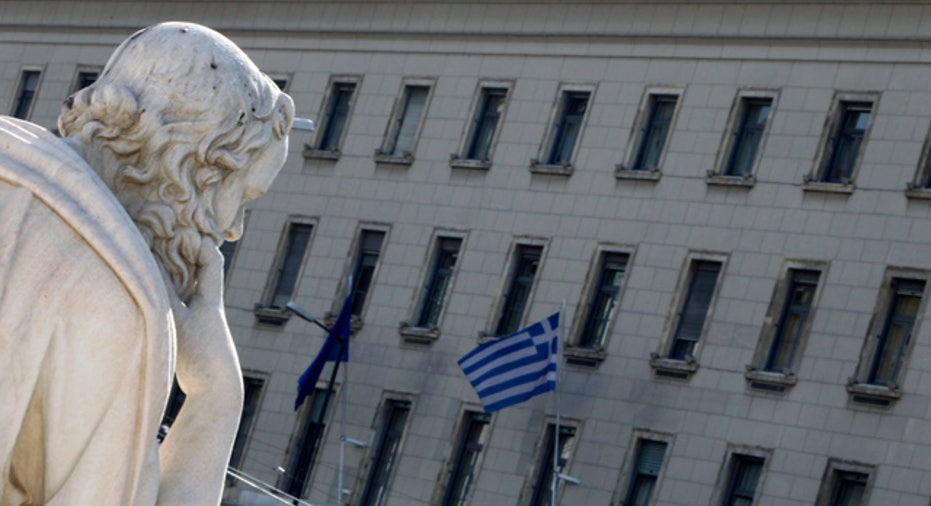Greek Default: Orderly or Disorderly?

The question of whether or not Greece will default seems moot at this point. Greece is in the process of defaulting. The only question is whether the default will be orderly or disorderly.
Make no mistake. The ongoing negotiations in which Greek debt holders are being asked to take losses estimated at around 70% of their original investment are tantamount to a default. Greece is acknowledging it can’t pay its debts, and that’s a default.
It’s the first phase of what all of Europe hopes is an orderly default.
The point has already been conceded by officials at two of the big three ratings firms. Last week a senior official at Standard & Poor’s told Bloomberg Television, “Greece will default very shortly.” And a Fitch official told Reuters, “It is going to happen. Greece is insolvent so it will default. So in that sense it shouldn’t be a surprise to anyone.”
[summary]
So regardless of how these current negotiations are described, the orderly default now being cobbled together in Athens greatly reduces the likelihood of a much messier alternative. But any final deal hinges on whether investors can be persuaded that taking massive losses is in their best interests.
A lot of people think it is.
Brian Dolan, chief currency strategist at Forex.com, described the worst-case-scenario of a disorderly default as “akin to mayhem.”
Argentina’s disorderly default in 2002 comes to mind. At the time, Argentina simply stopped paying its debts and the country’s economy came to a virtual standstill. Rioters, angered by severe austerity measures and soaring inflation, vented their frustrations on banks and foreign companies. The widespread chaos chased foreign investors out of Argentina and a decade later the country has yet to fully recover.
Europe is desperate to avoid a repeat of Argentina in Greece. That’s why Europe’s fiscal decision makers – namely the leaders of the European Union, the European Central Bank and the International Monetary Fund -- are being patient with the tortuous process now playing out in Athens.
An agreement is needed soon, however. Greece must come up with 14.5 billion euro by March 20 to pay down its bond debt. If Greece fails to make that payment, it will almost certainly trigger a disorderly default, the impact of which is certain to reach far beyond Greece’s borders.
Inside Greece the impact would be devastating. Greek banks would be forced to close for an extended period to prevent runs by depositors afraid of losing their life’s savings. A banking freeze could shut down Greece’s already fragile economy, causing shortages of food and other essential goods.
Greece has been wracked with protests for months by citizens angered by harsh austerity measures imposed largely by authorities outside Greece. If a worst-case disorderly default scenario plays out, some fear those protests could escalate into civil war.
On a global scale, if Greece is unable to meet its obligations in March, the default would trigger payment of costly credit default swaps written by various large financial institutions to protect investors against that very possibility.
But given the fragile state of the global economy, there are fears that those financial institutions couldn’t cover the credit default swaps. There could also be an increase of collateral requirements on contracts related to other countries, requiring further cash burdens on those financial institutions. That could set off a domino effect much like the situation in 2008 when insurer AIG couldn’t cover credit default swaps triggered by the collapse of investment bank Lehman Brothers.
If the institutions that wrote credit default swaps on Greece can’t cover their losses, they in turn can’t pay their debts to their creditors. Those creditors then can’t pay their debts, and so on.
The hope among Europe’s leaders is that Greece can persuade as many of its creditors as possible to voluntarily accept the haircuts, a move that would avoid triggering the credit default swaps. By most estimates, Greece will need 90% of its bondholders to agree to the cuts for that to happen.
There will be elements of a disorderly default unless 100% of those creditors agree to the cuts, an unlikely scenario.
“Governments will push for it to be orderly and voluntary, but the individual investors may file suit and litigate the matter,” said Peter Tchir, with TF Market Advisors in Connecticut.
Already there have been reports that a major Spanish hedge fund has dropped out of the negotiations. No wonder. Various reports suggest that under the agreement now under consideration bondholders would take a 70% loss by virtue of cutting the bonds’ face value in half, reducing the average interest rate to between 3.5% and 4% and pushing repayment of the bonds 30 years into the future.
Such an agreement would reduce Greece's debt by about euro100 billion, or $131.1 billion, and save it billions of euros in interest payments.
Another wild card that could throw the delicate situation into chaos is Europe’s patience with Greece’s fiscal policy makers in terms of the latter’s conviction for implementing further austerity measures sought as part of a rescue packages cobbled together in October.
If the EU, the ECB and IMF decide Greek politicians don’t have the stomach to cut spending further, they could rescind that 130 billion euro rescue package, forcing Greece into default.
Many critics of Europe’s approach to the long-running debt crisis have argued that Greece should have been allowed to default months ago. An earlier default, they argue, would have isolated the problem in Greece and allowed Europe to spend its time and resources addressing similar debt problems in Italy and Spain, two countries whose economies are far more important to the eurozone than Greece’s.
But after allowing the process to drag out for this long, it’s unlikely Europe’s leaders will settle on that option now.



















